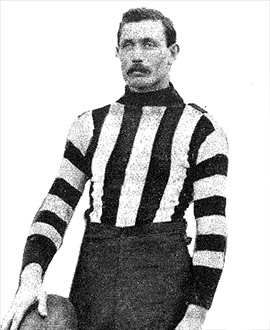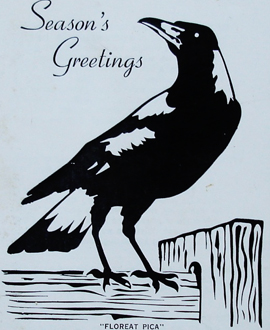A STRUGGLE FOR POINTS. COLLINGWOOD LASTS LONGEST. NOTES BY OBSERVER.
There were just the ordinary changes that the chances and mishaps of play bring about when the University and Collingwood teams faced each other at Victoria-Park on Saturday. With the University's height and dash, and Collingwood's undoubted cleverness in the short play, I fully expected to see a very fine game, in which the two styles of play would be contrasted; but in this was disappointed, for there was very little style about it for half the match, and the game, as an exhibition of skill, did not at all realise expectation.
There was some indecisive play along both wings at the start, and finally the University, with the wind slightly in their favour, earned it to the river end. A high markby Hartkopf led to a pass on and another good mark by Kerr, who missed his shot. Gibb, the Collingwood wing man, with a rush, took it out of danger, and Collingwood were in a favourable position when a free kick to Gray, One of the 'Varsity backs, relived the strain. The play was not good, and the umpire was particularly strict in not allowing men to hold the ball. A mark to Gray, who was well shepherded by Boynton turned another Collingwood rush, but Herbert had a snapshot soon afterwards which missed the goal. Martin sent it well into the Magpies' goal, where Rowell marked and saved Ryan was playing finely in the crush for Collingwood, and he was mainly responsible for getting the ball into a position where a nice series of exchanges ended in a snapshot for Herbert, who squeezed a goal, the University home man marking it just behind the line of the posts. Lee took a fine mark mail, just afterwards, but fell heavily, and was with difficulty able to pass the bill on a few yards to a friend. The advantage of position was not, however, wasted, for Herbert got it in front, and snapped a second goal.
A University rush gave Matthews a shot at a very acute angle, but he was equal to it, and scored a fine first goal for the University, who were not playing with anything like the smart system of Collingwood. They scrambled over each other - made too many mistakes. Collingwood had a fine chance once with, with half a dozen of their forwards grouped in front, but, helped by a little luck, Boynton saved the situation. Gray tried to make a bolt by bouncing instead of kicking in but the ball was brought back to the goal line where a rush by West got the University out of a serious difficulty.
Collingwood were having the better of the play, and Gray, Greenham, and Boynton had to show their very best in the defence. At the first change Collingwood led by 7 points, but the game was not at all an attractive one, the ball apparently beating the men. Collingwood were the more clever in passing; otherwise there was nothing in the play.
In the second term, Brake at once passed the ball forward to Matthews, who made a poor shot. A good mark by Greenham in the crush, and his shot was even more finely marked by Hartkopf close in. The second goal to the University followed as a matter of course. Collingwood went down with a breezy rush, and Wilson had a shot which found the University backs out of place, and a goal was got on the bounce. Next a good mark by Scadden stopped the University just outside the danger zone. McLeod had a snap for them and missed. Martin was playing a first-rate game on the wing, but in some poor scrambling the University only forced behind.
There was a lot of uneventful football before Greenham, with a rattling dash, took it up the ground. Gibb and Dykin sent it forward again, and Lee got a shot at a sharp angle, but only brought one flag. Collingwood's defence was very sound. They were better than the University in smartly correcting their mistakes. It was the second point in which they excelled, and up to half-time, when they led by a goal, the play was still indifferent.
There was something wanting which one could not well define, and the strictness of the umpire in forbidding them to hold the ball seemed to hamper both sides.After some even battling, a series of passes between Hinman, Greenham, and Kneen ended in a goal for the University, the scores then being level, 22 points each.
Collingwood were pressing, when Boynton came to the relief. Then Hurry, playing forward from the centre, passed the ball on to Hartkopf, who took his shot and the impressive silence told that it was a god for the University. In a minute the fighting was in front of then goal, and a series of quick exchanges, in which Collingwood always excelled, gave Herbert a chance to snap fourth goal. The scores being again even, the game got more exciting, and as Boynton went down helpless for a few minutes in a tussle. Hughes marked right in goal, kicked straight, and put Collingwood in front once more. The University answered with a determined rush but a lot of hard play ended only in a behind. A sudden dash by Hurry down the centre gave Matthews, who was not at all at his best, the chance to get fifth goal and the University in turn led by a point. They were pressing it then, and Boynton had two shots in succession but missed both of them. At the last change the University were leading by two points.The game had greatly improved in this quarter. There was at least more vim in it and fewer bungles.
On opening the last quarter. Lee, being jambed in on the wing, unselfishly played out to Baxter, who got sixth goal for Collingwood. Immediately afterwards Ryan got a free kick which Lee marked, and passed with perfect judgment out to Vernon who, however, missed his shot. Some rattling play by Greenham in the centre of the ground gave Matthews a chance to snap the University's sixth goal and they were a point ahead.
Excitement grew intense when Collingwood went down the wing with a rush, and Herbert had a shot,which hit the goal-post making the scores even and the crowd wildly excited. A bad kick off was marked by Jones, who sent it on to Ryan, but at a crisis he missed his shot badly - did not even get a behind they were battling for the point, then Collingwood pressed the attack but they were long in scoring. One shot hit the butt of the behind post, the next scored a point,and Collingwood were by that point in front.
Once the University looked like getting home, but failed just out of range, and a nice series of passes gave Hughes a shot and another behind for Collingwood. They were playing the better game now, and Wilson had another shot, which only, added another behind. A University rush almost brought them within range, but failing this, their last effort, they were beat on and Collingwood won a game, exciting only in its evenness by four points.
For the winners, McHale played football which was both clever and effective; but their hardest work was done by Ryan and Baxter, both of whom made the mistake, however, of always wanting to get past just one more man. I liked the defence of both Scadden and Shorten, but Lee was greatly hampered by the fact that he had to captain the team. For once in two years he failed to get a goal, and his seldom been seen to less advantage. Herbert did excellent work forward, where he snapped three goals, and Hughes was a hard if not always scientific worker. Vernon was just a little ahead of several other men in general merit.
For the University, E. Cordner was at his best, and did a lot of determined work. Hartkopf was not quite so prominent as usual. He made a mistake, I think in playing so far out, for his tries were out of range, and the University were always weak between him and the goal. Greenham played strongly; Gray and Willson were companions in defence; and Martin was very smart on the wing. Ratz maintained his recent improvement, and Brake and Boynton were both useful. The University, however, lost the match on their forward lines.
One incident of the game will be brought before the investigation committee. E. J. Cordner (University) and W. Strickland (Collingwood) waited on the umpire (Elder) to learn if he had anything to report. He told them that O'Donoghue (Collingwood) had complained to him of some language used by Tymms (University) and had said he would report him (Elder) if he did not lodge a complaint against Tymms. "Therefore,” said Elder, “I am reporting Tymms."
1910 'A STRUGGLE FOR POINTS.', The Argus (Melbourne, Vic. : 1848 - 1957), 20 June, p. 6, viewed 7 August, 2015, http://nla.gov.au/nla.news-article10865289



